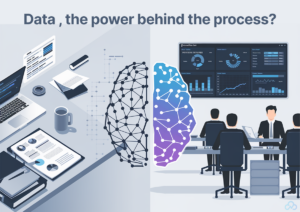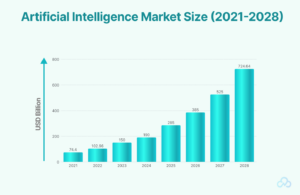Introduction
Artificial Intelligence (AI) isn’t just a new tech trend anymore but it’s a basic part of how businesses grow and improve today. The real challenge is making AI actually work for your business by using a plan that gives real results.
Why AI Matters More Than Ever
There’s no doubt that your business should embrace AI, but how. From automating basic tasks to giving highly-personalized customer experiences, AI is not just revamping business but it is also reinventing it. But here’s the thing: having access to AI tools and technologies isn’t enough. What separates successful companies from the rest is a well-thought-out AI strategy well crafted with intention, driven by data, and aligned with business goals.
That’s where AI consulting services steps in. The right AI consultant doesn’t just plug in algorithms but they act like a GPS guiding you through the unknown, avoiding costly deviations, and helping you reach your goal.
AI Consulting: It’s More Than Just Tech Advice
Let’s be clear about a common thing: AI consulting services isn’t about dumping a robot into your customer service team and hoping for a miracle. Leading AI consultants understand that every business is different. A bank has different priorities from an eCommerce brand. A healthcare startup needs more compliance than a logistics firm. So, a one-size-fits-all AI solution? That’s a red flag.
Good AI consultants begin by understanding your business like it’s their own. They explore your goals, pain points, processes, and customers. Then, and only then, do they recommend AI solutions that truly fit. Think of them as both tech savvy and business therapists.
What Makes an AI Strategy “Robust”?
If your AI strategy is to chase the latest tech trends, it’s going to flop. A strong AI strategy starts with basic questions. What are your business goals? What does success look like for your team, your customers, and your final result? A good AI strategy doesn’t just chase innovation but it solves problems that already exist.
Many top-notch consulting firms like McKinsey and BCG focus on the importance of a strategy-first approach. They advise businesses to treat AI as a main project but not as a side pillar of digital transformation. This means aligning AI investments with long-term business goals- like operational efficiency, better risk management, or new income streams.
The best strategies are basics. They’re built with business, data, and user experience in mind, not just code.
Data, The Power Behind the Process?

Let’s talk about the elephant in the room- The data. AI is only as good as the data it learns from. If your business data is distributed across spreadsheets, outdated CRMs, or messy email chains, even the best AI in the world won’t help.
That’s why one of the first things AI consultants do is audit your data. Not to criticize but to clean it up, outline it, and figure out what’s usable. They’ll also guide you on collecting better data moving forward. Without that main pillar, your AI strategy is like something which is trying to build a skyscraper on sand that won’t stand for long.
An experienced consultant can help you build a strong data pipeline, clean historical data, and set up systems to capture real-time analytics. Which leads to the groundwork for smarter models that actually deliver business value.
To put this into view, consider how Netflix handles data. They analyze vast amounts of viewing history, search queries, and even pause/rewind behavior to train AI models that predict what shows you’ll love next. This is the power of clean, well-structured data fueling a smart AI strategy.
Beyond Tech: AI’s Ethical Side
Here’s a thing- AI can be biased. It can make wrong predictions. It can even damage trust if not handled responsibly. That’s why modern AI consultants don’t just wear their tech hats but they also think like ethicists.
They’ll think like:
- Will your AI model treat all customers equally?
- Can your team explain why the AI made a certain decision?
- Are you getting customer data in an ethical way?
73% of customers are more likely to trust companies that are open about how they use AI, this study found in 2023, by PwC. This is especially important in areas like healthcare, finance, and education, where trust really matters. Having a strong AI plan isn’t just about using advanced tools it’s also about using them in the right and responsible way.
Leading AI consultants work closely with legal and compliance teams to build outlines ensuring AI systems don’t reinforce stereotypes or unfair practices. They also help organizations establish ethical review boards and regular audits to maintain transparency and fairness.
AI Trends That Are Reshaping Consulting
AI is popularizing rapidly. And AI experts are experiencing trends like Explainable AI (XAI, which focuses on creating transparent AI decision-making. In highly regulated industries, this is becoming non-negotiable. Banks and all, for example, must explain why a loan was denied, it should not be just blame a black-box algorithm.
Another trend is the growth of vertical AI solutions- tools tailored to specific industries. Retail AI focuses on inventory and customer insights. Healthcare AI predicts patient outcomes. These niche tools are increasing adoption because they solve specific, bigger problems.
Also, the rise of AI governance is changing how consulting services are delivered. Businesses are no longer interested in flashy demos, they want policies and guidelines. Consultants now help set up ethics committees and audit trails to monitor how AI systems evolve over time.
Moreover, AI is becoming democratized through no-code and low-code platforms, enabling non-technical users to create AI-powered workflows. AI consultants help companies navigate this new area, deciding when to build custom models and when to leverage off-the-shelf tools.
Real-World Example: Walmart’s AI-Driven Retail Transformation
Let’s see how an AI consulting firm made an amazing difference for a global retail company: “Walmart”.
One of the biggest retail chains globally, Walmart faced challenges in inventory management, in-store efficiency, and delivering a tailored customer experience in a wide range. Instead of trying other things they took a way through solutions, Walmart partnered with AI consultants and tech specialists to transform its retail management using data-backed strategies.
Here’s how they did worked on it:
Supply Chain Management:
Walmart used AI to help and manage inventory in its many stores. By using trendy tools that can tell what’s needed, they were able to avoid having too much unnecessary stock, keep shelves full, and make sure products were available when customers needed them.
In-Store Automation:
Walmart started employing robots with cameras to see shelves for missing or misplaced items. This helped keep stores organized and allowed employees to spend more time helping customers instead of doing routine tasks.
Product Customization:
Walmart also used AI to understand what each customer likes. By looking at past shopping habits, they were able to offer better search results and suggest products that matched each person’s needs. This made shopping easier and more enjoyable for customers, both in stores and online.
The End Result?
Walmart experienced an amazing improvement in operational efficiency, customer experience, and supply chain resilience, all done and dusted by a focused AI strategy crafted with experts consulting.
This example illustrates a hard truth that the right AI strategy, supported by expert consultants, doesn’t just fix what’s broken but also it reimagines how business gets done.
What Happens When You Skip Strategy?
Many companies came into AI because it sounds trendy. They buy expensive platforms or hire data scientists without a clear roadmap. And the result? Wasted time, budget overruns, and internal confusion.
One common downfall is what experts call the “AI Graveyard”, projects that start with excitement but end in silence. Why just because there was no buy-in from leadership, no clarity on success metrics, or no infrastructure to support the AI model after launch.
AI consultants help prevent this by mapping out phases: pilot testing, scaling, integration, and post-launch evaluation. They ensure that the organization is prepared, technically and culturally to adopt AI successfully.
You can take the example of a large telecom company that launched a chatbot to reduce customer support calls. Without proper strategy, the bot failed to understand complex queries, frustrated customers, and was eventually shelved. Had they engaged consultants to define objectives, train the model with relevant data, and integrate human fallback options, the outcome would likely have been very different.
How AI Is Changing Product Development
AI development services involve creating smart systems that can handle data well, make good predictions, and learn on their own or with help from people. We keep improving these systems so they work better and match your business goals.
Artificial Intelligence (AI) is becoming one of the essential parts of every step in product making. From the initial research phase to the buying or decision making process, AI helps businesses work faster and smarter.
One main use of AI development services is in predictive maintenance. This means using AI to read sensor data from machines and tools. By doing this, AI can predict the future when a machine might have a problem, allowing companies to fix problems beforehand. This cut-down repair costs and saves unexpected downtime and keeps everything running smoothly.
AI is also making a positive difference in quality control. Older product checks can be slow and sometimes make mistakes. But with AI, tracking is faster and more correct. Machines powered by AI can easily scan and check products, highlighting any defects or issues that need a quick-fix. This helps businesses produce better quality products and reduce waste.
The Product development in AI market is expected to grow quickly and reach around 1 trillion after 2026 according to the industry study. This shows how more and more companies are starting to use AI to stay competitive and meet customer expectations.
Another benefit of using AI is customizing products as we read in the case study of Walmart.. AI can track what a customer has searched for, bought earlier, or added to his cart. With all this information, businesses can suggest the best product options like the right size, color, or features that suit each person’s preferences. This leads to good customer experience and more sales.
To make all of this done, many businesses work with AI development companies. These consultants help create smart tools and systems that are customized to a company’s needs. They help companies create better products and services by using the trendy AI technologies in a way that’s easy to manage.
In summary, AI is changing how products are made, checked, and personalized. It helps companies save time, costs, and offer better options to their customers all while staying ahead in the market.

How to Choose the Right AI Consulting Firms
Choosing an AI consultant can be stressful. Here are some tips to guide you:
Look for Experience: AI is not one-size-fits-all. Find consultants who understand your sector’s unique challenges and regulations.
Check Their Expertise: Consultants should have strong data management skills, not just AI knowledge.
Focus on Teamwork: The best consultants work closely with your team, not just as outsiders delivering solutions.
Ethics and Governance: Ensure your partner prioritizes ethical AI practices and compliance.
Proof of Outcomes: Ask for case studies and valuable outcomes from ex-clients.
Conclusion: Start with Strategy, Then Add AI
If you’re confident about using AI to level-up your business, don’t get distracted by shiny tech. Focus on strategy. Find consultants who care about your success, not just the software. Build systems that are ethical, sustainable, and scalable.
It’s a tool, do not use it as a magic wizard. And like any tool, its value comes from how and why you use it.
So, start by asking the right questions. Get expert help when you need it. And most importantly, build your AI strategy on a foundation of purpose, not just possibility.
Do you like to read more educational content? Read our blogs at Cloudastra Technologies or contact us for business enquiry at Cloudastra Contact Us